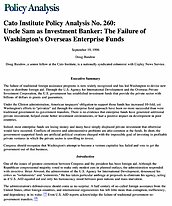Under the Clinton administration, American taxpayers’ obligation to support those funds has increased 10-fold, yet Washington’s efforts to “privatize” aid through the enterprise fund approach have been no more successful than were traditional government-to-government transfers. There is no evidence that enterprise funds have generated additional private investment, helped create better investment environments, or had a positive impact on development in poor countries.
Indeed, most enterprise funds are losing money and many have simply displaced private investment that otherwise would have occurred. Conflicts of interest and administrative problems are also common at the funds. In short, the government-supported funds are artificial political creations charged with the impossible goal of investing in profitable private ventures in which the private sector is unwilling to invest.
Congress should recognize that Washington’s attempt to become a venture capitalist has failed and vote to get the government out of that business.


